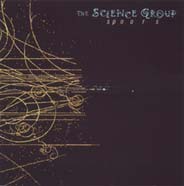
The
Science Group
Spoors
(ReR)
Released
in 1999, the first album by the composite line-up called The Science
Group titled …A Mere Coincidence.. seemed in many ways to want to
follow in the interrupted path that had been travelled by News From
Babel in its combining music and lyrics, even if the result were quite
different (and not as memorable). Again, the lyrics were by Chris Cutler
(also on drums), while the music and keyboards were by Novi Sad musician/composer
Stevan Kovaks Tickmayer, a former pupil of Louis Andriessen and leader
of the Tickmayer Formatio. Just as important was the contribution by
former Thinking Plague Bob Drake, whose studio work was essential to
enrich the compositions with timbres and montages. Amy Denio on vocals,
guitars by Fred Frith, clarinets by Claudio Puntin. The album didn’t
get a lot of attention (there could be many reasons for this), but among
the few comments I read there was one that filed the work under "progressive"
(in a favourable way).
So
I’d like to know that writer’s opinion about Spoors, the new work released
under the Science Group name. Different coordinates: the previous album
featured songs, while here we only have instrumental compositions, some
in the form of suites. Still featured are Cutler, Drake and Tickmayer,
the quartet is rounded by US guitarist Mike Johnson, a member of Thinking
Plague. Spoors is in many ways a work that really can be filed under
"progressive", even if it could be (rightly) argued that:
Tickmayer’s references are wider and more complex than the prog norm,
that his compositional logic (quite postmodernist, I’d say) is obviously
very different, that the instrumental skills (not to mention the studio
work) are enormously superior to any prog group past and present, and
so on.
All
this reasoning won’t change one iota in the reaction of the listeners,
who it’s not at all difficult to imagine being enthusiastic or disgusted
according to their perception of this compositional idiom, today. I
doubt most will bother listening past track 3, Timeline 5, particularly
after the episode with that organ and a guitar solo that sounds a lot
like Phil Miller did thirty years ago. (I hate shooting, but it’s quite
difficult to imagine another guitar player using a vocabulary and sounds
as trite and absolutely incapable of producing any emotional response
as those used by Mike Johnson on all this record.) And even if Chris
Cutler’s drums sometimes appear to succeed in making us think of late-period
Henry Cow (think: Western Culture), the most pertinent reference is
really late-period Univers Zero – who overdubbed their parts while reading
from a score. (And what’s "progressive" without any fire?)
From
a compositional point there are a lot of good parts (Dispersants, 2
Bagatelles, many parts of Old And New Paths), but Kovacs’s predilection
for atmospheres that jump from one style to another is not welcome to
me, and in the end his work resembles more a work by a University professor
that’s written to be performed in front of a group of peers than to
(what for me is) a rock album.
(A
press release that writes "What is really novel about The Science
Group is that this is rock music composed and performed with the rigour
of contemporary classical music" shoots itself in the foot.)
Beppe
Colli
©
Beppe Colli 2004
CloudsandClocks.net
| Jan. 18, 2004


